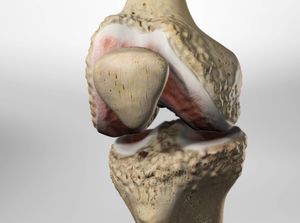Osteoarthritis is the primary cause of knee arthritis and results from wearing down the smooth articular cartilage covering the ends of the bones (thigh bone, shin bone and kneecap).
Knee pain may keep you from being as active as you like. And it may come from a gradual breakdown of your knee's cartilage. That's a protective tissue on the ends of your bones. In a healthy knee, the bones glide smoothly against each other. But in a knee with osteoarthritis, cartilage begins to wear away. Bone rubs against bone. Bony bumps we call "bone spurs" may form.
What is it?
Osteoarthritis is the primary cause of knee arthritis and results from wearing down the smooth articular cartilage covering the ends of the bones (thigh bone, shin bone and kneecap). Loss of cartilage results in pain, stiffness, decreased function, swelling, joint deformity and eventual immobility.
Osteoarthritis can eventually progress to bone-on-bone contact, which results in further increasing pain and stiffness in the knee joint. This bone-on-bone contact induces the formation of bone spurs (osteophytes) that will also contribute to the pain and reduce mobility.

What causes it?
Why does knee cartilage break down? For many it's a part of the wear and tear of aging. For others it's linked to an injury. Your risk for osteoarthritis of the knee is higher if you have a job that puts a lot of stress on your knees. Being obese raises your risk too. Ask your doctor about other risk factors.
Signs & symptoms
Symptoms of osteoarthritis of the knee include pain, swelling and stiffness. You may have trouble bending or extending your knee. It may feel weak. It may lock or buckle when you walk. Standing or walking for a long time can make your knee feel worse.
Non-Surgical Treatment
How do we treat osteoarthritis of the knee? In the early stages, things like physical therapy, weight loss and a knee brace may help. Medications and joint injections may help too.
Surgical Treatment
If these aren't working, you may need surgery. Your doctor will create a care plan that's right for you.
Arthritis of the knee
Osteoarthritis is the primary cause of knee arthritis and results from wearing down the smooth articular cartilage covering the ends of the bones (thigh bone, shin bone and kneecap). Loss of cartilage results in pain, stiffness, decreased function, swelling, joint deformity and eventual immobility. Osteoarthritis can eventually progress to bone-on-bone contact, which results in further increasing pain and stiffness in the knee joint. This bon-on-bone contact induces the formation of bone spurs (osteophytes) that will also contribute to the pain and reduce mobility.
Arthritis can also develop after prior trauma to the knee, which is known as post-traumatic arthritis. Prior trauma can include a fracture in or around the knee joint, a prior ligament injury (ACL or multi-ligament knee injury), or other cartilage or meniscus injury. Even after trauma, the development of arthritis usually takes years or decades to develop.
Inflammatory arthritis is another form of knee arthritis that can lead to degeneration of the joint. It is an inflammatory disease synovium (the specialized membrane lining the inside of the joint), and it also causes pain and decreased range of motion. Inflammatory arthritis is a systemic disease and comes in many forms including, rheumatoid arthritis, lupus, and psoriatic arthritis, among many others.
Early stages of arthritis can be treated with rest, activity modification, weight loss, anti-inflammatory medications, bracing, and injections. Several injections are available, including steroid injections, lubricant injections ("gel" or "rooster shot"), and biologic injections (PRP or BMAC). Steroid injections are recommended at this first-line treatment, while the other options may be recommended based on a variety of patient and radiographic factors, and these options should be discussed with your doctor. When these non-surgical treatments fail to alleviate symptoms, a total knee arthroplasty (joint replacement) is the most reliable, effective and long-term treatment for arthritis of the knee.
At The Knee Center at Andrews Sports Medicine, our fellowship-trained non-surgical physicians and orthopaedic surgeons provide the most-advanced, comprehensive treatment solutions for injuries and disorders of the knee. To schedule an appointment, call (205) 939-3699.
Request an Appointment OnlineBack to Knee







